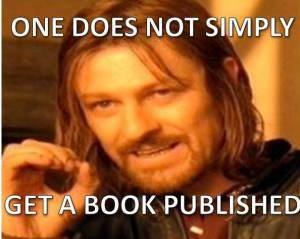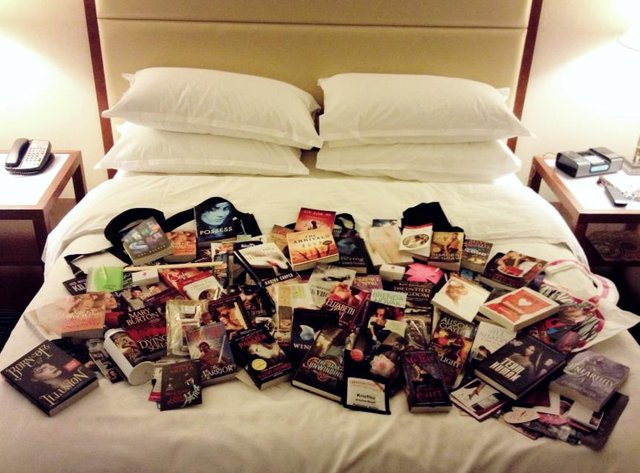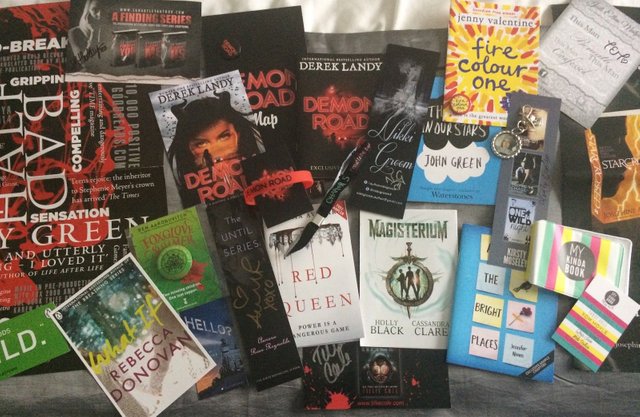Publishing, Part 3: A Guide to Marketing
So, you found a way to get published, you know how the money works, and you’ve got a decently written book. The task now is getting people to buy and read it! How? Marketing, whether you’re a mainstream mogul/sellout or indie hero/hack, is the key to getting your book the attention it requires to flourish in the marketplace. So how do you do that?
Good news! Marketing your book is kind of like being on Steemit!
Bad news. Marketing your book is kind of like being on Steemit.
The Cover, Not the First Line, is the Hook
Even with the decline of brick and mortar bookstores, even with summaries and reviews readily available through services like Amazon or Goodreads, the book’s cover is still considered 90% of what sells the book to a new reader. It’s the first thing that the reader sees, that invites them to look further and either look into reviews or just One-Click it and send it to their Kindle.
If you’ve gone the traditional route and have signed on with a publisher, your input on the cover will be minimal to non-existent. Publishers often have in-house artists or artists on retainer to produce the cover that they feel will be the most marketable. As a result, you might end up with a scene that isn’t in the book, or a cover model that looks nothing like your protagonist. It won’t be until your reputation (and agent) carry a bit more weight that you’ll be able to dictate exactly what you want to see on the covers of your books.
With smaller and electronic presses, you’ll have more input, but the work will be generally lean toward Photoshopped images and often stock photos with title and author splashed in fonts that are in line with the publisher’s marketing plan. Again, you’ll have input, but it is, in the end, the publisher’s decision.
Self-published authors have a lot more freedom, but either have to create their covers themselves (which usually doesn’t go well), or they hire cover artists. In the latter case, it will be a negotiation of rights, and how they’ll be compensated. Most artists will accept payment in exchange for releasing rights for the image to you, because remember, in the end it’s still their creative work that you’re planning to use to make money off whether your book is 15,000 words or 150,000. Some others, often in the case of Amazon publishing, will prefer a cut of the royalties. It depends on the artist, but always ask to see their portfolio first, and answer their questions about what you want to see as thoroughly as possible. Reference images will help a lot, as well.
You’ll also want pre-release feedback on your cover. Friends and family and beta readers can provide good feedback, but make sure to get people who will give honest feedback. @TheWritersBlock offers discussion of cover art on their Discord and also is home to a few cover artists as well, if you’re looking for someone you can pay in Steem.
www.YourAuthorName.com
Do you have a website that’s specifically for your author persona? Does it have links to your books? Photos of you and a bio? Answers to common questions? Content that isn’t just “Hey! You! Buy my book! NOW!”? Widgets for your Twitter and Instagram? Methods of contact? Links to your representation/publisher if you have it?
If not, guess what you’ll be doing this weekend? Every successful author has a website, whether it looks professional or dredged from the 90s dreams of GeoCities and Angelfire pages, or even a Livejournal. Often, one look at your website will reveal your commitment to professionalism, or at least let your readers know the kind of author you are. Even if it’s simplistic, you can still set up a WordPress in 30 minutes if you plan to use a template, and the cost of registering the domain name isn’t as bad as you might think.
How to Handle Interviews
You’ll feel like you’ve made it when someone asks to interview you about your book, and you sort of have. But in order to do well in interviews, whether it’s a personal interview with a college newspaper or an e-mailed list of question or a Skype call or a podcast or chatting on nationally broadcast television, there’s one general rule: Stay on brand.
“On brand? What’s that?” Glad I imagined you asked. Your brand is you, or rather, Author You, the persona you’ve crafted based on your writing, social media interaction, interviews, and the like. It’s what people think of when they hear your name, and it can be a powerful marketing tool, and one that’s truly your own.
For interviews, there’s you-you, and there’s author-you. The latter will be doing the interviews with bits of the former sprinkled in to ground you as a real person. Generally you want to research common interview questions, and have a good idea on how to answer those. More often than not, the questions you’ll be asked will be given to you beforehand, because the interviewer doesn’t want you sputtering for an answer, and you should have complete answers for every question ready and rehearsed, or well-reviewed in the case of an e-mail interview.
Also, be familiar with the interviewer and the work they’ve done before to have an idea of their style and the flavor of answers that their audience would prefer. If interviewing in person or on Skype/Facetime/Snapchat/Discord/Etc., make sure your appearance is “on brand” as well, as artists and creatives get a little more leeway regarding dress code so long as you don’t go NSFW (unless your work, and the place interviewing you, is as part of their brand). Answer questions, have some anecdotes prepared just in case, and don’t ramble, because you’re usually on a clock, or space is limited.
Everybody Loves Free Stuff
There are authors all over the Internet who are giving books away for free right now, whether on Amazon or their own personal websites. It’s not uncommon for authors to put out sneak-peek PDFs of their upcoming books, or for publishers to put out digests to give readers a taste of their wares. Goodreads gives members the chance to host giveaways on their author pages, or enter contests to get a full run of the author’s work.
Does it work? Some insist yes, others swear it’s pointless. Regardless of your opinion, unless you’re self-publishing, you absolutely need your publisher to sign off on anything that even looks like giving their product away for free. Giveaways have been accused of be ranking manipulation on Amazon in order to boost one’s visibility and platform, sometimes by investing heavily in buying one’s own books to get your book to the top of your genre’s ranking page. (See why I stated earlier it’s a lot like Steemit?)
The upside is that you’ll expose your work to a lot of new readers. The downside is that it’s a chunk of your profits/royalties and there’s no guarantee that you’ll break big or get any overflow onto your other books. Some people grab free books just because they’re free or super-cheap and never read them. (Which might remind you of Steam sales or Humble Bundle giveaways and libraries of 1000+ games though you only play the same 2-3 a month.) Giveaways are attention, and you’ll have to capitalize on it, and even if you do, you can’t count of it paying off. It’s a gamble, and the height of the risk depends on how big you want to go.
The Other Side of the Con Table
An invitation to a convention is a triumph for a newly-published author. It’s an opportunity to interact directly with readers, other writers, reviewers, publishers, and agents in a welcoming community environment with plenty of events and chances to network. Also, they’re generally held in nice hotels, so it can also double as a nice vacation, even though it’s not really a vacation as you’ll be working whenever you aren’t asleep.
Generally, only authors represented by publishers or agents get the opportunity to be more than a convention attendee, but self-published are invited if their following is large enough, and if they can afford the entrance and registration fees. Required now is a smartphone to take plenty of pictures with other authors and fans, events, panels, and anything else you find in synch with your brand, as well as a decent data connection to keep your social media feed flowing with updates tagging both the convention and any authors or events not just for the followers at home, but also for the attendees trying to navigate the con.
Panels
If invited, you’ll likely be asked to join panels, or group discussions centering around a certain topic that your work or brand would be somehow connected to depending on the audience. For example, when I attended Coastal Magic, I was on a panel about using comedy, another panel about writing gay male characters (where I was the only male-identifying person in the room), and a final panel that was literally about being a male-identifying author at the convention that was the closest that I would ever get to Christopher Rice.
How panels work is much like interviews, in that you have to answer common questions, often directly by readers, but the whole thing is controlled by the moderator. Who’s that? The person who takes questions and keeps things moving, and makes sure that no one panelist is monopolizing the event. It’s a more relaxed atmosphere, and you’ll get to answer some fun questions interspersed with the more common “how do you come up with ideas?” You’ll also get to banter, put in asides, have a chance to be funny or poignant, and get a little bit of spotlight. It’s like being on a reality show for 30-60 minutes and thinking on your feet without stepping on anyone’s toes while staying on brand. For most of the audience, it’ll be a first meeting. For my first panel? I brought assorted donuts telling the front row I was crassly attempting to buy their love. It got laughs, and a few of them remembered me later.
The Plight of the Tote Bag (Con Swag)
Swag is an inevitability of attending a convention, especially a book based convention.
That’s one author’s swag haul from RT, Romantic Times, one of the largest book conventions in the country.
And that’s just the books.
And if you’re attending a con? You’ll have to bring your own. Copies of books are common, as are sneak-peeks, and are often deposited into the tote bag that’s been produced expressly for the con. How do you get swag to pass out? Often you go through your publisher’s marketing department, unless you’re with a smaller press where the marketing department isn’t as robust. If you’re with a larger publisher, you might allowed several dozen copies of your most current release or selections from your backlist to either give to the con representatives, or pass out at your designated table. If you’re with a smaller press, you’ll likely have to buy your own books at a discounted price to sell on your own or give away, depending on your standing with your publisher (whether you’re a best-seller or a mid-to-low list). Self-publishing, well, guess what you get to do? If you’re e-books only, it’s common to give away promo codes to redeem for free copies, but otherwise, you’re going with non-book swag.
What’s used for non-book swag? When we finally were ready to check out of the hotel, we dumped out our swag bag to pick and choose what we’d be taking with us. Besides the 29 books in the bag? We found the following items branded with the author’s name: About 40 pens. 6 chocolate bars (that tasted like band candy sold to raise money to get better band candy) wrapped with custom wrappers. A hair scrunchie. A T-shirt in "women's small". 15 button pins. A meshback trucker hat for a paranormal romance about zombie gardening (which TOTALLY wasn't a rip-off of Plants vs. Zombies). 6 pencils. A mini-flashlight that worked for about 40 seconds. A cheap hand towel with the author's name stenciled on. 70 business cards. 2 dozen refrigerator magnets for review blogs. 2 flash drives that only had 16MB of storage. 5 CD-ROMS from small presses with small teasers for all of their currently released and upcoming books. And my own swag entry, which was a paperboard card with my book cover on it and my social media listed on the back.
Swag is an investment, and a lot of it is, to be honest, crap. Like a lot of the convention attendees, we left an apologetic note and $5 tip for housekeeping and left the pile of everything on top of the bed because we didn’t want to pay baggage check fees for an additional 24 pounds of cargo. It’s branded material that fades into the noise of the other hundred-plus authors that dropped off swag for the bags as well. Does this mean you shouldn’t do it? There are attendees that go just for the swag and finding new authors to read, as well as the other nifty little things to show their fan-love, so it’s generally up to you if you want to make the investment. Swag can run from a hundred dollars to a few thousand depending on how big you’re going, and at the higher end, you’ll likely make your own swag bags.
Please Like/RT/Follow
If you’re on Steemit, you’re familiar with the above request. You want the upvotes, the resteems, the higher organic follower count, because the more of that you get, the more you develop your platform and the more you’re likely to make money. It’s the same with social media, which might be patently obvious to you, but as an author building a brand, you need that level of accessibility. You need a Facebook page, a Twitter feed, an Instagram feed, all likely hooked into your website so you can cross-post over all of them. Even if you hate social media, you’ll need to get involved, and follow other authors and people you admire, post pictures on Instagram, statuses on Facebook, do AMAs on Reddit all to flesh out the persona and brand that you’re presenting to the world. Yes, even Steemit is part of your social media profile because every platform is an audience, every post and tweet is a connection to those who follow you.
Social media is often the arena where you develop your brand, the sort of people you follow, how to compose a tweet, the kinds of pictures you take, the kinds of Youtube shows or podcasts you work on or listen to, or Twitch/Dlive streams you put out or watch. It’s all a part of your online identity that it’s your responsibility to curate.
At the End of It…
Marketing and self-promotion are considered the worst part of the job for many writers as it’s an extroverted activity for an often introverted person. There are marketing firms if you have the money or a prosperous publisher, as well as interns you can hire to handle your social media, but at the end of it all, it still needs your input and guiding hand to keep it all on message, on trend, and on brand.
And even if you find the time for it all?
You still need to write your next book.
Resources



I wasn't even aware that an authors website was that essential since I've never been on one. It's probably different for other readers, but I don't really care who that person is who wrote the book.
I do fall for a lot of the other things listed here, though.
It's generally requested by publisher when wanting to know contact information. Also, it's a handy thing for your business card, which yes, authors are required to have if they're going to go out in the world. :)
This is all so true. And so hilarious. XD Great job.
Thanks! If you haven't already, @thewritersblock is a great place both to talk about writing and publishing as well as commiserate with fellow writers. :)
LOL. I know. It's me, Tiny. XD
Well, you guys change your names every other day. :)
Keeps life from getting boring. ;-)
This is fantastic. Not only true, but funny as crap. You really know how to keep your reader entertained. :-)
My favorite part:
Oh, lawd. Soooo true.
Glad you enjoyed it! :) And yeah, I haven't even been here 6 months and I figured that out in the first 3 weeks. XD